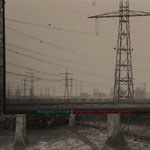
CD, Topheth Prophet, 2007
www.topheth.org
Throughout our everyday existence there is a constant aural stream flowing from our environment. Everything from conversations between strangers, the crackling of leaves, and the machines of modern industrial living wailing and cranking away seeps into our unconscious mind. While most people can easily discard these bits of disassociated memory, the artists behind Moljebka Pvlse and Seventeen Migs of Spring utilize these relics to form a lucid dream of disconnected familiarity.
The album is essentially a fusion of two works. The first is Moljebka Pvlse’s “Ravha,” a single twenty-six-minute track, which is followed by Seventeen Migs of Spring’s “Electricity Gardens” (tracks two through seven). Both works are centered on the heavy use of field recording manipulation. “Ravha” is a bit more organic, with more voice recordings and sampling of mundane activities. It starts off with light crackling and the turning of gears. A controlled cacophony is overlaid by what seem to be casual conversations amongst travelers, a train operator announcer, and the footsteps of children. The entirety of the track is a steady continuation of this theme, everyday sounds manipulated to create an eerie sense of anxiety and unfamiliarity.
“Calm Gardens (At Night)” is a joint collaboration between the two artists. Here we have a steadily growing mechanical rumble enveloped by faint electronic glitches and oscillating frequencies. Towards the end something of a beat arises from the clanging of sticks. The rest of “Electricity Gardens” follows the along the same lines, with cold electronic and random bits of environmental sampling. The weird twanging strings, metallic crashes, and sped up clangs rearranged for surround sound on “Alternating Current” can get a bit repetitive until the feedback kicks in towards the end and jars the listener with a schizophrenic assault. “Koocha Elektrichestva (mix.up.in.formation)” has an almost harsh noise feel to it, with the levels turned way up and variety of electronic feedback wailing in from different channels. “Direct Current” calms it back down with electric pops and glitches on top of a thick drone.
While this breed of experimental music takes a certain mood and environment, say a surround sound system and a quiet evening, I would definitely recommend this release for a new perspective on sounds we easily take for granted.
[8/10]
— Raul A.
